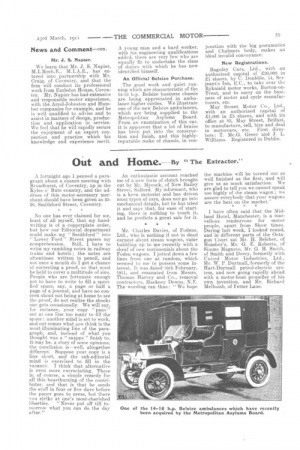Out and Home.—By "The Extractor."
Page 13

If you've noticed an error in this article please click here to report it so we can fix it.
A fortnight ago I penned a paragraph about a chance meeting with Broadhurst, of Coventry, up in the Kyles o' Bute country, and the address of this motor-accessory merchant should have been given as 2526, Smithford Street, Coventry.
No one has ever claimed for me, least of all myself, that my handwriting is of a copperplate order, but how our Editorial department could make my " Smithford " into " Lower Ford" Street passes my comprehension. Still, I have to write my rambling notes in railway ti ains and hotels ; the notes are oftentimes written in pencil, and not once a month do I get a chance of correcting a proof, so that must be held to cover a multitude of sins. People who are fortunate enough not to have to write to fill a specified space, say, a page or half a page of a journal, and have no concern about not being at home to see the proof, do not realize the shocks one gets occasionally. We will say, for instance, your copy " pans " out at one line too many to fill the space : another mind is set to work, and out comes what you think is the most-illuminating line of the paragraph, and, instead of what you thought was a " snappy " finish to, it may be. a story of some opinions, the conclusion is well, altogether different. Suppose your copy is a line short, and the sub-editorial mind is exercised to fill in the vacancy. I think that alternative is even more excruciating. There is, of course, a simple remedy for all this heartburning of the contributor, and that is that he sends the stuff in four or five days before the paper goes to press, but there you strike at one's most-cherished
liberties. "Never put off till to morrow what you can do the day after."
An enthusiastic account reached me of a new form of clutch brought out by Mr. Mycock, of New Bailey Street, Salford. My informant, who is a keen motorist and has driven most types of cars, does not go into mechanical details, but he has tried it and says that, for ease of starting, there is nothing to touch it, and he predicts a great sale for it.
Mr. Charles Davies, of Fodens, Ltd., who is nothing if not in dead earnest about steam wagons, came bubbling up to me recently with a sheaf of new testimonials about the Foden wagons. I jotted down a few lines from one at random, which seemed to me to possess some interest. It, was dated 16th February, 1911, and emanated from Messrs. Thomas Harvey and Co., removal contractors, Hackney Downs, N.E. The wording ran thus : "We hope the machine will be turned out as well finished as the first, and will give us as much satisfaction. We are glad to tell you we cannot speak too highly of the steam wagon ; we assure everybody that your wagons are the best on the market."
I have often said that the Midland Hotel, Manchester, is a marvellous rendezvous for motor people, apart from Show times. During last week, I looked round, and in different parts of the Octagon Court sat Mr. H. Belcher, of Humber's, Mr. G. E. Roberts, of Simms Magneto, Mr. G. H. Smith, of Smith and Dorey, formerly with United Motor Industries, Ltd., Mr. W. P. Durtnall, formerly of the Hart-Durtnall petrol-electric system, and now going rapidly ahead with a motor-boat propeller of his own invention, and Mr. Richard Mellmish, of Fetter Lane.






















